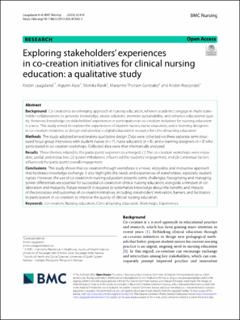| dc.contributor.author | Laugaland, Kristin Alstveit | |
| dc.contributor.author | Aase, Ingunn | |
| dc.contributor.author | Ravik, Monika | |
| dc.contributor.author | Gonzalez, Marianne Thorsen | |
| dc.contributor.author | Akerjordet, Kristin | |
| dc.date.accessioned | 2023-11-17T13:13:24Z | |
| dc.date.available | 2023-11-17T13:13:24Z | |
| dc.date.created | 2023-11-06T20:27:51Z | |
| dc.date.issued | 2023 | |
| dc.identifier.citation | Laugaland, K., Aase, I., Ravik, M., Gonzalez, M. T. & Akerjordet, K. (2023). Exploring stakeholders’ experiences in co-creation initiatives for clinical nursing education: a qualitative study. BMC Nursing, 22, Artikkel 416. | en_US |
| dc.identifier.issn | 1472-6955 | |
| dc.identifier.uri | https://hdl.handle.net/11250/3103273 | |
| dc.description.abstract | Background: Co-creation is an emerging approach in nursing education, wherein academics engage in multi-stakeholder collaborations to generate knowledge, ideate solutions, promote sustainability, and enhance educational quality. However, knowledge on stakeholders’ experiences in participation in co-creation initiatives for nursing education is scarce. This study aimed to explore the experiences of student nurses, nurse educators, and e-learning designers in co-creation initiatives to design and develop a digital educational resource for clinical nursing education.
Methods: The study adopted an exploratory qualitative design. Data were collected via three separate semi-structured focus group interviews with student nurses (n = 7), nurse educators (n = 8), and e-learning designers (n = 3) who participated in co-creation workshops. Collected data were then thematically analyzed.
Results: Three themes related to the participants’ experiences emerged: (1) The co-creation workshops were enjoyable, useful, and instructive; (2) power imbalances influenced the students’ engagement; and (3) contextual factors influenced the participants’ overall engagement.
Conclusions: This study shows that co-creation through workshops is a novel, enjoyable, and instructive approach that facilitates knowledge exchange. It also highlights the needs and experiences of stakeholders, especially student nurses. However, the use of co-creation in nursing education presents some challenges. Recognizing and managing power differentials are essential for successful co-creation in clinical nursing education, alongside a mindset of collaboration and mutuality. Future research is required to systematize knowledge about the benefits and impacts of the processes and outcomes of co-creation initiatives, including stakeholders’ motivation, barriers, and facilitators to participation in co-creation, to improve the quality of clinical nursing education. | en_US |
| dc.language.iso | eng | en_US |
| dc.rights | Navngivelse 4.0 Internasjonal | * |
| dc.rights.uri | http://creativecommons.org/licenses/by/4.0/deed.no | * |
| dc.title | Exploring stakeholders’ experiences in co-creation initiatives for clinical nursing education: a qualitative study | en_US |
| dc.type | Peer reviewed | en_US |
| dc.type | Journal article | en_US |
| dc.description.version | publishedVersion | en_US |
| dc.rights.holder | © The Author(s) 2023. | en_US |
| dc.source.volume | 22 | en_US |
| dc.source.journal | BMC Nursing | en_US |
| dc.identifier.doi | https://doi.org/10.1186/s12912-023-01582-5 | |
| dc.identifier.cristin | 2192944 | |
| dc.relation.project | Norges forskningsråd: 273558 | en_US |
| dc.relation.project | SHARE - Centre for Resilience in Healthcare: 5091 | en_US |
| dc.source.articlenumber | 416 | en_US |
| cristin.ispublished | true | |
| cristin.fulltext | original | |
| cristin.qualitycode | 1 | |

